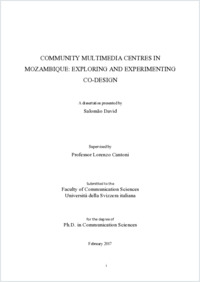Community multimedia centers in Mozambique : exploring and experimenting co-design
- Cumbula, Salomão David
- Cantoni, Lorenzo (Degree supervisor)
-
31.01.2017
189 p.
Thèse de doctorat: Università della Svizzera italiana, 2017 (jury note: Cum laude)
Co-design
community multimedia centre
Mozambique
ICT4D
information and communication technologies for development
rural communities
telecenter
English
The overall aim of this doctoral thesis was to elucidate the premises and conditions in which a co-design approach can be used with rural communities in Mozambique and the usage of Information and communication technologies for development as a tool for supporting rural communities on daily activities. The doctoral thesis includes five papers, a systematic literature review, and four case studies. The literature review (I) provides an overview of 34 studies that describe the implementation of co-design with rural communities. In the review, papers published between 2002 and 2013 were clustered in three groups – information system, social design, and ICT4D. The analysis provided insightful information about the knowledge and taxonomies required to understand how actually co-design can be used to support communities. While the conventional development paradigm asserted that developing countries could be propelled to growth path by knowledge emanating from developed nations, new approaches give priority to design partnerships and participation by the local civil society as the best method to achieve sustainable development. Paper (II) describes a case study implemented in the Morrumbene district (Mozambique), which emphasizes the need to explore design spaces and meaningful dialogs to share past experiences and contextual knowledge. Data were collected via focus group sessions, which had as participant’s people from the local community, the CMC staff, and two researchers. Findings from the Morrumbene case show that an equalitarian approach where all participants’ ideas and perceptions are taken into consideration provides an artefact that unifies ideas and perceptions. It also creates conditions for individuals with social and political differences to work together, share ideas and competencies. Paper (III) brings a case study implemented in the Quelimane municipality. The case outlines a design perspective that brings up proactivity and trust as additional condiments to be taken into consideration while co- designing. Papers (IV) e (V) provides understanding on how co-design can be used to produce sustainable services for the community. The cases analyse aspects that hinder – or even stop – intended positive ICT4D benefits to becoming a reality. The case studies here presented were performed in the three regions of Mozambique (south, central and north), with social groups with different education level, language, and social status working towards the same objective. The findings of this thesis could be used to develop a plan to support CMC and to further improve rural community’s usage and adoption of ICT. CMC services are an important endeavour with significant payoff in communities’ daily lives and activities. This thesis also contributes to a more complete, balanced, and grounded image of how CMCs and local communities can work together to create socially and financially sustainable services.
- Language
-
- English
- Classification
- Social sciences
- License
-
License undefined
- Identifiers
-
- RERO DOC 288031
- URN urn:nbn:ch:rero-006-115956
- ARK ark:/12658/srd1318612
- Persistent URL
- https://n2t.net/ark:/12658/srd1318612
Statistics
Document views: 445
File downloads:
- Texte intégral: 449
